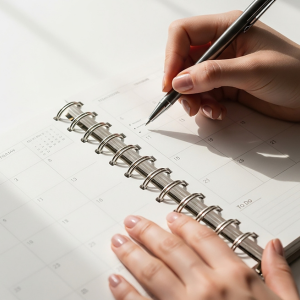Have you ever wondered how highly successful people manage to achieve so much in a single day? The secret isn’t working longer hours—it’s daily planning. By organizing their day strategically, they maximize productivity, stay focused, and make consistent progress toward their goals.
Daily planning isn’t just about creating a to-do list; it’s about prioritizing tasks, managing time efficiently, and aligning daily actions with long-term objectives. When done right, it reduces stress, eliminates distractions, and ensures that every day moves you closer to success.
In this post, we’ll explore 6 actionable steps for effective daily planning that successful people follow, along with tips, common mistakes to avoid, and the benefits of making planning a daily habit. Whether you’re an entrepreneur, professional, or student, these strategies will help you take control of your day and achieve more with less effort.
Table of Contents
What is Daily Planning?
Daily planning is the process of organizing your day in advance to focus on the tasks that matter most. It’s about creating a clear roadmap for your day so you can work efficiently, stay productive, and achieve your goals.
Key elements of daily planning include:
- Setting Priorities: Identifying the most important tasks for the day.
- Scheduling Tasks: Assigning specific time slots for work, meetings, and personal activities.
- Goal Setting: Breaking larger objectives into actionable steps to accomplish daily.
- Time Management: Using strategies like time blocking to minimize distractions.
- Reviewing Progress: Reflecting on completed tasks and adjusting improvement plans.
Benefits of Daily Planning:
- Boosts productivity and focus
- Reduces stress and decision fatigue
- Improves time management and efficiency
- Helps track progress toward long-term goals
- Encourages discipline and consistency

Why Daily Planning is Crucial for Success
Daily planning is more than just making a to-do list—it’s a strategic approach that successful people use to manage their time, energy, and priorities effectively. Without a clear plan, it’s easy to get distracted, waste time, or feel overwhelmed by tasks.
Key Reasons Daily Planning Matters:
- Provides Clarity and Focus
Planning your day helps you know exactly what needs to be done. This clarity reduces confusion and ensures your energy is directed toward high-priority tasks. - Boosts Productivity
When your day is structured, you spend less time deciding what to do next. This efficiency allows you to accomplish more in less time. - Reduces Stress and Overwhelm
Knowing your daily priorities and having a roadmap makes even busy days feel manageable. It prevents last-minute rushes and decision fatigue. - Encourages Accountability
Writing down goals and tasks makes you more committed to completing them. Daily planning creates a sense of responsibility toward your own success. - Supports Long-Term Goals
Daily planning isn’t just about today—it’s about aligning small daily actions with bigger life and career objectives. Consistent planning leads to consistent progress.
Common Daily Planning Mistakes to Avoid
Even the best intentions can go wrong if daily planning is done incorrectly. Avoid these common mistakes to make your planning effective:
- Overloading Your Day
Trying to do too much can lead to burnout and frustration. Focus on high-priority tasks instead of filling every hour. - Neglecting Flexibility
Life is unpredictable. Failing to leave buffer time for unexpected tasks or interruptions can derail your plan. - Skipping Reflection
Not reviewing what worked and what didn’t prevents improvement. Reflection helps you refine your daily planning system. - Ignoring Energy Levels
Scheduling demanding tasks at times when your energy is low can reduce efficiency. Align tasks with your natural peak hours. - Using a Poor System
Relying on scattered notes or a cluttered planner can make your plan confusing. Choose a clear, organized method for daily planning.
Tip: Recognize these pitfalls early, and adjust your planning method to stay consistent and productive.

Tips to Make Daily Planning a Consistent Habit
Consistency is key to reaping the benefits of daily planning. Here are practical ways to make it a habit:
- Plan at the Same Time Every Day
Many successful people plan their day either the night before or first thing in the morning. This builds routine and ensures continuity. - Use a Planner or Digital Tool
Keep all tasks, goals, and time blocks in one place. Tools like Notion, Google Calendar, or a physical planner work great. - Start Small
Don’t overwhelm yourself with too many tasks. Begin with 3–5 priorities and gradually expand as planning becomes a habit. - Review and Adjust Regularly
Reflect on what worked and what didn’t. Adjust your plan daily to improve efficiency and results. - Reward Yourself
Celebrate completing tasks or sticking to your plan. Positive reinforcement strengthens the habit.
Tip: By following these tips consistently, daily planning becomes second nature, helping you stay organized and productive every day.
Benefits of Daily Planning
Daily planning is more than just organizing tasks—it’s a powerful habit that can transform your productivity, focus, and overall success. Here are the key benefits:
- Increases Productivity
By prioritizing tasks and allocating specific time slots, you get more done in less time. Daily planning keeps you focused on high-impact activities. - Reduces Stress
Knowing exactly what needs to be done prevents last-minute rushes and decision fatigue. A clear plan brings calm and confidence to your day. - Improves Time Management
Planning your day allows you to manage your hours efficiently, ensuring that important tasks are completed while avoiding wasted time. - Enhances Focus
With a roadmap for the day, distractions are minimized. You can concentrate on what truly matters instead of reacting to every interruption. - Supports Goal Achievement
Daily planning aligns your small daily tasks with your bigger goals, helping you make consistent progress toward personal and professional objectives. - Encourages Accountability
Writing down tasks and goals creates a sense of responsibility, making you more likely to follow through and complete your commitments.

The Impact of Daily Planning on Your Life
Daily planning doesn’t just organize your day—it can have a profound impact on your personal and professional life. When done consistently, it transforms how you manage time, approach challenges, and achieve goals.
Key Impacts of Daily Planning:
- Higher Productivity Levels
By clearly outlining tasks and priorities, daily planning helps you accomplish more in less time, making your efforts more effective. - Better Decision-Making
Planning reduces impulsive decisions. You approach tasks strategically, which leads to smarter choices throughout the day. - Improved Work-Life Balance
Structured planning ensures time is allocated not just for work but also for self-care, family, and personal growth, promoting balance and well-being. - Enhanced Focus and Discipline
Daily planning builds habits of focus and discipline, helping you stay on track even when distractions arise. - Consistent Progress Toward Goals
When small daily actions align with bigger objectives, progress becomes visible, motivating you to stay committed and achieve long-term success. - Reduced Stress and Anxiety
Knowing what to do, when to do it, and having a plan in place lowers uncertainty and minimizes stress.
The impact of daily planning goes beyond productivity—it reshapes your mindset, habits, and overall approach to life, setting the foundation for success.
Strategies to Make Daily Planning a Habit
Consistency is key to reaping the full benefits of daily planning. Turning it into a habit ensures that you stay organized, focused, and productive every day. Here are some effective strategies:
- Plan at the Same Time Every Day
Choose a specific time—either the night before or first thing in the morning—to plan your day. This creates a routine that your brain associates with preparation and focus. - Start Small
Begin with a manageable number of tasks or priorities, such as 3–5 key items per day. Gradually increase as planning becomes natural. - Use a Planner or Digital Tool
Tools like Google Calendar, Notion, or a physical planner help keep all your tasks organized in one place. Pick a system that suits your style. - Set Reminders and Alerts
Notifications or alarms can help reinforce the habit until it becomes automatic. - Reflect and Adjust Daily
Spend a few minutes reviewing what worked and what didn’t. Adjusting your plan helps improve efficiency and builds a stronger habit. - Reward Yourself
Celebrate sticking to your plan or completing tasks. Positive reinforcement makes the habit more enjoyable and sustainable.
6 Steps for Effective Daily Planning
Daily planning is the secret weapon of highly successful people. It allows them to prioritize tasks, manage time efficiently, and maintain focus on what truly matters. Whether you’re an entrepreneur, professional, or student, mastering daily planning can dramatically improve your productivity and help you achieve your goals consistently. In this post, we’ll explore 6 practical steps for effective daily planning that successful people follow.
Step 1: Start with a Morning Routine
Successful people know that a productive day begins with a structured morning. Before diving into emails or meetings, they dedicate time to setting their mindset and energy for the day. A solid morning routine might include:
- Meditation or mindfulness exercises
- Journaling or gratitude practice
- Light exercise or stretching
- Reviewing priorities for the day
Tip: Use the first 30–60 minutes of your day for yourself before tackling work. This small investment sets a positive tone and increases focus.
Step 2: Set Clear Goals for the Day
Daily planning is ineffective without clear goals. Successful individuals define what they want to accomplish each day and write it down. This helps prevent distractions and keeps them accountable.
- Identify your top 3–5 priorities for the day
- Break larger tasks into smaller, actionable steps
- Assign realistic deadlines
Tip: Use the SMART framework (Specific, Measurable, Achievable, Relevant, Time-bound) to make your daily goals more actionable.
Step 3: Prioritize Tasks Using the 80/20 Rule
Not all tasks are created equal. Successful people focus on the 20% of tasks that produce 80% of the results. Daily planning involves identifying high-impact activities and tackling them first.
- Create a priority list with “must-do” and “optional” tasks
- Schedule high-priority tasks during your peak energy hours
- Delegate or eliminate low-impact tasks
Tip: Use tools like the Eisenhower Matrix to distinguish urgent vs. important tasks effectively.
Step 4: Time Block Your Day
Time blocking is a proven technique used by top performers to maintain focus. It involves assigning specific time slots for each task instead of multitasking.
- Allocate uninterrupted periods for deep work
- Include short breaks to recharge energy
- Block time for meetings, emails, and admin tasks
Tip: Use a digital calendar or planner to visually map out your day and stick to your time blocks.
Step 5: Review and Adjust Midday
Even the best daily plans need flexibility. Successful people review their progress around midday to ensure they’re on track. This allows them to adjust priorities if needed.
- Check off completed tasks
- Reassess remaining tasks and deadlines
- Move non-essential items to the next day if necessary
Tip: A quick 10-minute midday review can prevent stress and improve productivity for the rest of the day.
Step 6: End the Day with Reflection
Daily planning doesn’t end when work hours are over. Reflection is a key habit of successful people—it helps them learn, improve, and prepare for tomorrow.
- Review completed tasks and celebrate wins
- Analyze what didn’t work and why
- Plan the next day’s top priorities
Tip: Keep a short journal or planner to track patterns, progress, and lessons learned over time.
How Daily Planning Boosts Productivity
Daily planning is a powerful tool that helps you get more done in less time. By organizing tasks, prioritizing important activities, and creating a clear roadmap, you can significantly increase your efficiency.
Ways Daily Planning Boosts Productivity:
- Focus on High-Priority Tasks
Planning allows you to identify the most important tasks of the day and tackle them first, ensuring your energy is spent on activities that have the biggest impact. - Reduces Time Wasted
Without a plan, it’s easy to get distracted or spend time on low-priority tasks. Daily planning minimizes wasted time by providing structure. - Prevents Overwhelm
Breaking your day into manageable tasks prevents feelings of stress and overwhelm, making it easier to maintain consistent productivity. - Enhances Decision-Making
Knowing what to do and when reduces the need for constant decision-making, which saves mental energy for executing tasks. - Encourages Consistency
Daily planning creates routines and habits that keep you moving forward steadily, even on busy or challenging days.
Daily Planning Tips for Beginners
Starting a daily planning habit can feel overwhelming at first, but with simple strategies, anyone can make it a natural part of their routine. Here are practical tips for beginners:
- Start Small
Focus on planning 3–5 important tasks each day instead of trying to schedule everything at once. This keeps your plan manageable and achievable. - Choose the Right Tool
Use a notebook, planner, or digital app like Google Calendar, Notion, or Todoist—whichever feels easiest to stick with consistently. - Pick a Planning Time
Decide whether you prefer to plan your day the night before or first thing in the morning. Consistency in timing helps form a habit. - Prioritize Tasks
Identify your “must-do” tasks versus optional ones. Focus on completing high-priority tasks first to ensure meaningful progress. - Include Breaks and Flexibility
Don’t over-schedule. Leave buffer time for unexpected tasks and short breaks to maintain energy and focus throughout the day. - Reflect and Adjust
At the end of the day, review what worked and what didn’t. Adjust your plan for the next day to continuously improve your system.
Daily Planning Tools and Apps You Can Use
Using the right tools can make daily planning easier, more organized, and more effective. Whether you prefer digital apps or a traditional planner, there’s a solution for every style.
Top Tools for Daily Planning:
- Google Calendar
Perfect for scheduling tasks, meetings, and reminders. You can set recurring events, color-code priorities, and sync across devices. - Notion
A versatile workspace that allows you to create to-do lists, databases, and goal trackers—all in one place. Ideal for those who like customization. - Todoist
A simple yet powerful task manager that lets you set priorities, deadlines, and recurring tasks. It’s great for keeping daily tasks organized. - Trello
Uses boards, lists, and cards to visualize tasks. Trello is ideal for visual planners and project management enthusiasts. - Physical Planner or Notebook
Some people prefer writing tasks by hand. A physical planner can help you disconnect from screens and create a tangible sense of accomplishment. - Time-Blocking Tools (e.g., Clockify, Toggl)
Perfect for tracking time spent on tasks and maintaining focus using time-blocking techniques.
Tip: Start with one tool that fits your style and stick with it. Avoid using too many tools at once, as that can create confusion instead of clarity.
Conclusion: Master Daily Planning for Long-Term Success
Daily planning is more than just writing a to-do list—it’s a powerful habit that can transform your productivity, focus, and overall success. By following the steps successful people use, prioritizing tasks, reflecting on progress, and leveraging the right tools, you can take control of your day and achieve more with less stress.
Consistency is key. Start small, stay flexible, and gradually build a routine that works for you. Whether you’re a beginner or looking to refine your planning system, applying these strategies will help you stay organized, make smarter decisions, and move steadily toward your goals.
Take action today: Begin planning your day intentionally, and experience the difference that structured, thoughtful daily planning can make in your personal and professional life.




